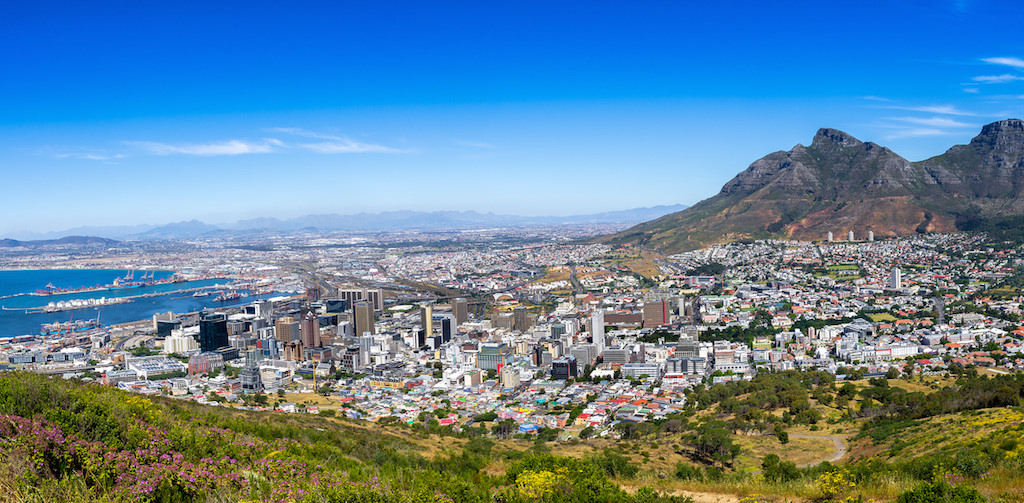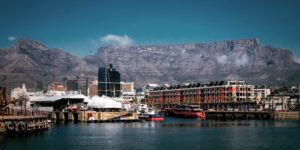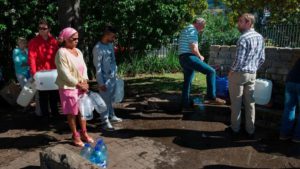Water Scarcity Threatens India and South Africa
More than a third of India’s electricity supply is at risk from water scarcity, which also threatens urban life in parts of South Africa. Cape Town, South Africa, in November 2017. (Gilbert Sopakuwa / CC 2.0)
Cape Town, South Africa, in November 2017. (Gilbert Sopakuwa / CC 2.0)
Water scarcity is now a real threat in two developing countries at the forefront of efforts to reduce climate change, India and South Africa.
This is not the tragically familiar story of extreme weather, stunted crops and foreshortened lives. It is a different sort of threat: to urban life, to industrial development, and to attempts to end poverty.
More than 80% of India’s electricity comes from thermal power stations, burning coal, oil, gas and nuclear fuel. Now researchers from the US-based World Resources Institute, after analysing all of India’s 400+ thermal power plants, report that its power supply is increasingly in jeopardy from water shortages.
The researchers found that 90% of these thermal power plants are cooled by freshwater, and nearly 40% of them experience high water stress. The plants are increasingly vulnerable, while India remains committed to providing electricity to every household by 2019.
Between 2015 and 2050 the Indian power sector’s share of national water consumption is projected to grow from 1.4 to nine per cent, and by 2030, 70% of the country’s thermal power plants are likely to experience increased competition for water from agriculture, industry and municipalities.
Power sector choking
“Water shortages shut down power plants across India every year,” said O P Agarwal of WRI India. “When power plants rely on water sourced from scarce regions, they put electricity generation at risk and leave less water for cities, farms and families. Without urgent action, water will become a chokepoint for India’s power sector.”
Between 2013 and 2016 14 of India’s 20 largest thermal utility companies experienced one or more shutdowns because of water shortages. WRI calculates that shutdowns cost these companies over INR 91 billion ($1.4 billion) in potential revenue from the sale of power.
It says water shortages cancelled out more than 20% of the country’s growth in electricity generation in 2015 and 2016.
The report offers solutions, including notably a move towards solar and wind energy. India already has a target for 40% of its power to come from renewables by 2030, under the Paris Agreement on climate change.
“Renewable energy is a viable solution to India’s water-energy crisis,” said Deepak Krishnan, co-author of the report. “Solar PV and wind power can thrive in the same water-stressed areas where thermal plants struggle…”
A policy brief produced by WRI and the International Renewable Energy Agency details ways for India’s power sector to reduce water usage and carbon emissions by 2030.
In Africa the dangers of water scarcity for one of the continent’s best-known cities, Cape Town, are imminent and, some believe, almost apocalyptic.
The city faces the prospect within three months of becoming the world’s first major city to run out of water, al-Jazeera reports.
It says the city’s water supplies are now so low that in late April it will declare “Day Zero”, the day when its reservoirs fall below a combined capacity of 13.5%.
This will mean Cape Town turning off the taps, except in the poorest neighbourhoods, and installing around 200 water collection sites across the city.
Water usage in the Western Cape province, which includes Cape Town, is now limited to a daily ration of 87 litres per person. If Day Zero dawns, that will drop to about 25 litres. The World Health Organisation says about 20 litres should be enough “to take care of basic hygiene needs and basic food hygiene”.
Rains start later
The province has had three years of drought. Kevin Winter, a senior lecturer in environmental science at the University of Cape Town, told al-Jazeera that as a winter rainfall region, people would normally expect rainfall to start somewhere around April.
“But that’s no longer the case, it comes a whole lot later at the end of June, or in early July, if we are lucky,” he said. “We are experiencing a rapid change in our weather patterns, which is increasingly evident of a climate change…”
Bridgetti Lim Bandi, who has lived in the city all her life, said Cape Town’s rainfall pattern had changed dramatically within the last two decades. “We don’t have a traditional Cape Town winter any more,” she told al-Jazeera.
Helen Zille is premier of the Western Cape province. She wrote on 22 January in the Daily Maverick: “The question that dominates my waking hours now is: When Day Zero arrives‚ how do we make water accessible and prevent anarchy?
“And if there is any chance of still preventing it‚ what is it we can do? …the challenge exceeds anything a major city has had to face anywhere in the world since the Second World War or 9/ll.”
Your support matters…Independent journalism is under threat and overshadowed by heavily funded mainstream media.
You can help level the playing field. Become a member.
Your tax-deductible contribution keeps us digging beneath the headlines to give you thought-provoking, investigative reporting and analysis that unearths what's really happening- without compromise.
Give today to support our courageous, independent journalists.




You need to be a supporter to comment.
There are currently no responses to this article.
Be the first to respond.